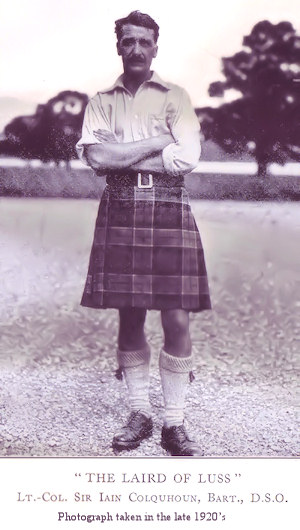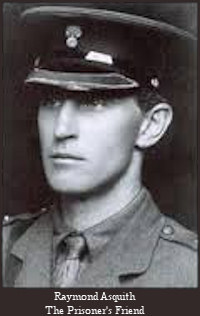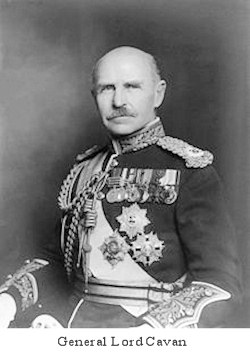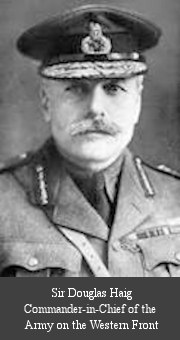Sir Iain Colquhoun’s Hand-Written Diary of Events Leading to his Court Martial
24th December 1915 – Tuesday 29th January 1916
 Introduction. During WW1 Sir Iain Colquhoun of Luss was an officer in the 1st Battalion Scots Guards serving on the Western Front. He had a distinguished career being both wounded and awarded a Distinguished Service Order (DSO) and bar and mentioned in despatches for bravery.
Introduction. During WW1 Sir Iain Colquhoun of Luss was an officer in the 1st Battalion Scots Guards serving on the Western Front. He had a distinguished career being both wounded and awarded a Distinguished Service Order (DSO) and bar and mentioned in despatches for bravery.
He was also, uniquely amongst the men from this area, court martialed for a very unusual offence – “Conduct to the prejudice of good order of military discipline in that on 25th Dec he (1) Approved of a truce with the enemy (2) Permitted a cessation of hostilities”.
He had participated in what was effectively a Christmas Day truce in December 1915 so that the Germans could collect and bury their dead. To-day that would be deemed a humane and correct thing to do but not by General Lord Cavan in 1915, who commanded the Division in which the Scots Guards were serving, and who was actually regarded as one of the better British generals of World War One, although one might think that there wasn’t a lot of competition for that title.
The Christmas Truce of 1914 which has passed into legend, and of which a first-hand account was given in the Lennox Herald of 23rd January 1914 by one of its participants Bonhill man, Sergeant William McAusland, 1st Battalion Royal Scottish Fusiliers, when he was home wounded less than a month after the truce, had given the British generals a severe fright.
No matter that both sides had quickly resumed killing each other with hitherto unseen ferocity after the truce, and that 1915 was as bloody as any other year in France and Belgium, the High Command was concerned that such truces undermined the men’s will to fight and had disciplined many of the soldiers who had participated in the 1914 truce. They had also issued strict orders that there was to be no repetition of the truce at Christmas 1915. To try to ensure that the order was obeyed they ordered the artillery and the machine gunners to fire off salvoes every few hours over the Christmas Period including throughout Christmas Eve and Day.
Sir Iain’s Diary, of which this is a transcript, explains why he, a Captain and Company Commander, believed that he was not ignoring that order, although a few of his superiors thought otherwise, and what happened to him and to his immediate superior Captain Miles Barne (sometimes spelt Barnes in the diary), in temporary charge of 1st Scots Guards, who was also court martialed. There has been an assumption since 1916 that Sir Iain was treated leniently because of who he was (apart from anything else his wife was the niece of the Prime Minister, Herbert Asquith) and that may be so, but it should be remembered that virtually every British officer of the time came from the upper classes and many were of similar social standing to Sir Iain, with exactly the same public school and landed gentry backgrounds: their set of values would have been the same as Sir Iain’s. So the officers who sat in judgement of him were his social peers and some at least would have had similar experiences of trench warfare, all of which would have made them more sympathetic to Sir Iain.
 As well as having the Prime Minister’s niece as his wife, he had Asquith’s son Raymond as his Prisoner’s Friend - which is what defence counsel are known as in military discipline. Raymond Asquith was a fellow front line officer – he was killed during an attack in the Battle of the Somme later in 1916 - and one of the finest minds of his generation.
As well as having the Prime Minister’s niece as his wife, he had Asquith’s son Raymond as his Prisoner’s Friend - which is what defence counsel are known as in military discipline. Raymond Asquith was a fellow front line officer – he was killed during an attack in the Battle of the Somme later in 1916 - and one of the finest minds of his generation.
Asquith was unimpressed by the military hierarchy generally, in particular their tactical incompetence, but chose to serve at the front and had a high regard for his fellow trench officers and soldiers. Sir Iain’s detached approach to the court martial, his belief that he had done the right thing and stood by it no matter what some of his superiors thought, impressed Asquith – it was very much in line with Asquith’s thinking, as he later recorded.
Asquith’s efforts did not get Sir Iain acquitted but they ensured that his sentence was the minimum possible. Sir Iain was found guilty but only received a Reprimand. General Haig, who had been Commander-in-Chief BEF only since 10th December 1915, and whose duty it was to confirm or reject the punishment, was smart enough to see all the pitfalls of the sentence.
He personally rejected even a Reprimand sentence and Colquhoun was immediately returned to full duties. He went on to a have a distinguished army career, and became Lord Lieutenant of Dumbartonshire soon after the war. To-day we would applaud his actions and condemn the foolishness of Lord Cavan for bringing the charges in the first place.
 His co-accused Captain Miles Barne, against whom the case was even more flimsy, was found not guilty and returned to full duties. Later promoted to Major he was killed in the Ypres sector of the front in September 1917.
His co-accused Captain Miles Barne, against whom the case was even more flimsy, was found not guilty and returned to full duties. Later promoted to Major he was killed in the Ypres sector of the front in September 1917.
The diary is of interest in many other ways too. Firstly, it sheds light on the considerable divide between the out-of-front line way of life of officers and other ranks. For Sir Iain and his friends, evenings were spent in dinners, visits to other regiments and playing poker. Drinks featured quite regularly. Perhaps the most striking difference, however, is the fact that Sir Iain could get 5 days compassionate leave while awaiting his court-martial to nip over to London for the birth of his son. Compare that to the experience of the ordinary soldier who could go a couple of years without home leave – unless he was unlucky enough to be wounded and sent home on recuperation leave.
Secondly, Sir Iain’s circle of friends contain some names who went on to considerable success in later life: Cecil Boyd-Rochfort became the Queen’s racehorse trainer, Oliver Lyttleton became 1st Viscount Chandos and served in Churchill’s Cabinets, Humphrey de Trafford became a prominent racehorse owner, and the grandfather of Brigadier Andrew Henry Parker Bowles, Camilla’s first husband.
The transcript is taken from a copy of the Diary which is now in the possession of the Imperial War Museum in London.
Deciphering the writing has presented a few difficulties and a “?” indicates that we aren’t sure of a particular word. The spelling is our best attempt at deciphering the hand-writing. Hopefully, we will be able to correct the full transcript over time.
The Transcript
December 24th 1915
......to the Firing Line. I hold? from Duck’s Bill and slightly beyond it to Sign Post Lane. ? night but gunners very active. The Germans ? on Sunken Rd and several times during the night we got shelled out of dugout.
December 25th Xmas Day
Stand to at 6.30. Germans very quiet. Remained in Firing Trenches until 8.30. No sign of anything unusual. When having breakfast about 9 am a sentry reported to me that the Germans were standing up on their parapets and walking towards our barbed wire. I ran out to our firing trenches and saw our men looking over the parapet and the Germans outside our barbed wire.
A German officer came forward and asked me for a truce for Xmas. I replied that this was impossible. He then asked for ¾ hour (three-quarters of an hour) to bury his dead. I agreed. The Germans then started burying their dead and we did the same. This was finished in ½ hrs time. Our men and the Germans then talked and exchanged cigars, cigarettes etc for ¼ of an hour and when the time was up I blew a whistle and both sides returned to their trenches.
For the rest of the day the Germans walked about and sat on their parapets. Our men did much the same but remained in their trenches. Not a shot was fired. At night the Germans put up Fairy lights on their parapets and their trenches were outlined for miles on either side. It was a mild looking night with clouds and a full moon and the prettiest sight I have ever seen. Our machine guns played on them and the lights were removed. Our guns shelled heavily all night at intervals of ½ an hour and the Germans retaliated on Sunken Road. I had to leave my dug-out five times during the night owing to shells.
December 26th
Fine day. No? rifle firing, but no Germans showing. I went at 10 a.m. to Winchester House to explain to a Court of Inquiry my conduct on Christmas Day. The Brigadier (who came round my trenches 10 mins after my truce was over) didn’t mind a bit but the Major General (Lord Cavan) is furious about it. The Coldstreams and our 2nd Batt are also implicated. Relieved by the 1st Irish Guards. Marched out by platoons down Sunken Road and Sign Post line to Rouge Choistr. Dropped the R.W.F. and marched via Riog? Bailleul to La Gorgue at 7 p.m. and billeted there.
December 27th
Very good billets. The Coldstreams are also here, Humphrey de Trafford just opposite. Had and cleaned up financially. Roger Timpeot? suddenly arrived to take over command from Miles Barnes. He saw all Company Commanders told them Esme had gone home sick and he was taking over command and gave us all notes on the way he wished things carried out.
December 28th
Practiced smoke helmet drill etc. Went to concert in evening. The men had their Xmas dinners in the afternoon. They were very good and enjoyed it.
December 29th
Esme suddenly re-appeared to report of his having gone sick being untrue. Roger returned to ? Brigade Hd Qtrs. Dined with Coldstreams. Guy Stewart, Byng Hopwood, Humphry de Trafford, Ricky Smith etc. Very good dinner. Played poker and lost 110 francs to Gilbert Follet. Bad head next morning.
December 30th
The row over the Xmas truce is still going on. I had to write my account of the thing about 8 times. Had Oliver Lyttleton, Byng Hopwood, and Guy Shaw Stewart to dine. Played bridge after.
December 31st
Court Martial in the morning at Merville. I rode in and back by 12.30. Mark Maitland president. Gave “C” company a New Years Eve suppers and concert. Great success, everything very well done. Batt dinner in the evening. ? good dinner. Kept it up until 12 midnight. Sang Auld Lang Syne then all went across to the Coldstreams. We joined up and went to Divisional H.Q. and sang till Cavan came down in his pyjamas. Went on to the Prince of Wales, but either he wasn’t in or wouldn’t come out, then on to the Brigade H.Q. and got Bicky Gritt? Guy Rarch? And the General out and wished them a happy New Year. Got to bed about 1.30.
January 1st New Years Day 1916
Stormy day. Had a hot bath. Paraded 2 p.m. and marched to the trenches near Laventie. Got shelled while picking up gum boots and R.W.F. but no one was hurt. I have two platoons in the front line, one in Red Bend fort and one in Ojm Fort. Relieved ? guards. This is a very good bit of the line, strong and in good order. Very quiet night.
January 2nd Sunday
Dull day. Little shelling and practically no sniping. The lines here are 250 to 300 yards apart. Quiet night. The front line here is laid for gas plant and the RE hope to set it up to-night but it is not to be followed by a raid.
January 3rd
The wind has been impossible for two weeks and the gas is to be removed to-night. Lovely day. Saw Guy Rasch and took a good many photographs. At 10 a.m. a stray bullet came through the top of my dug-out (corrugated iron) grazed the tip of my finger and went through Cecil Boyd Rocheford’s clothes in 2 places. Relieved by 3rd Grenadiers (Yorke) about 4.30 pm. The 2 platoons in the Fort marched straight back to billets. The 2 in the firing line under Cecil & I carried gas cylinders from front line trenches to Elgin Fort trolley line. Took 3 hours, 2 men to each cylinder. Finished about 8.30pm and marched back to billets at Laventie.
January 4th
At 8.30 received note from the Colonel telling me that I was under close arrest for my share in the Xmas Day truce, also Miles Barne. The others implicated were not being proceeded against. I am not allowed to leave my billet. Cooke ..oton and John Dyer etc came to see me. The 2 other platoons carried out a similar gas fatigue as last night. The gas was originally put in connection with a raiding scheme but a suitable occasion did not occur and it has now been removed.
January 5th
Still under close arrest, remained indoors all day. At 3 pm I was told I was in open arrest and ordered to attend a “Summary of evidence” at H.Q. The Brigadier, John Dyer, the Colonel, Norman, Ward, Harold B Rochford, Srg McAulay, cpl Robertson and Sergt Stevenson are all giving evidence about what occurred. Miles Barnes case came first. They are trying him for issuing orders not to shoot at the Germans when they were showing themselves.
At 4.30 pm I got a note and a telegramme from ? saying the ? had started and to come quickly. I asked the Brigadier who promised to see General Fielding (who had taken General Cavan’s place) and see what could be done. At my summary of evidence which was taken at 5.30 p.m. before Byn Hopwood, the witnesses had to give their evidence before me while Byng wrote it down. The Colonel was also in the room at the time. My witnesses were Sergt McAulay, Sergt Stevenson, Cpl Robertson the Brigadier and the Colonel.
Over by 6.30 pm. The Battalion in the meantime had marched up to the trenches. The Colonel and I went up by ourselves. I joined my Company but at 9pm I got a message from Battalion H.Q. that the Division had given me leave of absence. I went straight down to Brigade H.Q. at Levantie, saw John Dyer, Guy Rarch and the Brigadier who gave me 5 days leave.
January 6th
Leave (extra)
Slept there till 12.45 a.m. got up, made John Dyer’s pony into La Gorgue, caught the 1.31 am leave train there and arrived at Boulogne about 9.30 am. Met Con Seymour, had breakfast with him and got on the boat at 12.15 pm and after a very rough crossing reached Folkestone at 2 pm. Arrived London at 4.30 pm. Went straight to Seymour St not knowing whether the baby had been born or anything. Found Dinah in bed with the baby, which is a boy and although she had had a bad time she was wonderfully cheerful.
Evening 6th January to morning 11th - Leave in London
January 11th
Left Victoria 9.15 am arrived Folkestone at 11.15 am. Arrived Boulogne at 2.5 pm. Rough crossing and boat crowded. Went to Hotel de Paris and took a room there for the night. Dined at Hotel Louvre and went to bed early. My train does not leave until 12.50 pm to-morrow.
January 12th
Got up at 9 am and walked about till 12 noon. Went to station and caught the 1st train at 1 p.m. Very comfortable journey and reached La Gorgue at 7 pm. Met John Hopking who told me that Batt. was at Laventie. Walked from La Gorgue along the railway to Laventie and went to Brigade H.Q. Saw John Dyer who told me we were billeted here. Found the loft ? billets & joined them while they were having dinner at 8.30 pm.
January 13th
Paraded 2.30 pm. Welch friends marched in at 5 pm and took over our billets. Marched to billets on the outskirts of Merville?. Got in at 6.30 pm.
January 14th
Fair billets, but very re?ittered. Paraded etc.
January 15th
Had Batt. route march in morning. Played football against the 1st Coldstream in afternoon. Won by 1 goal. Visit to Follies at 8.00. Very good.
January 16th
Went to service in morning.
January 17th
This is the day of our court martials (Miles Barnes and myself). Motored into La Gorgue with General P? and the Colonel to Division H.Q. All the witnesses, members etc are assembling in the Hall. At 11.30 all witnesses are sworn in. The trial opened first of Miles Barnes. He is tried with Conduct to the prejudice of good order and military discipline for not giving definite enough orders for the procedure on Christmas day when in command of the Batt. At 2 pm his trial ends and the court is closed to consider their verdict. At 2.10 he goes in to receive their verdict which is “not guilty” and is exonerated from all blame.
At 3 pm my trial opens. I go in first and sit there during the whole procedure. The witnesses come in and give evidence. I am accused of Conduct to the prejudice of good order of military discipline in that on 25th Dec I (1) approved of a truce with the enemy (2) Permitted a cessation of hostilities.
Evidence in the following order – Capt. Lionel Norman 1st Scots Guards (not cross examined)
Capt Harrison – mining i.e. R.E.
He was cross examined by Raymond Asquith with the object of learning? that when I went up to the trenches on Xmas morning, I found a very advanced situation which I did my best to regularise by having a definite agreement as to how long the situation was to last.
 He was cross examined by the Prosecutor with the object of proving that there was a definite cessation on hostilities on Christmas morning.
He was cross examined by the Prosecutor with the object of proving that there was a definite cessation on hostilities on Christmas morning.
Capt Boyd Rocheford, 21st Lancers. Cross examined by prosecution with the same object.
Sergt MacAulay
Sarg Stevensoon all not cross examined
Corporal Robertson
Brigadier Ponsonby gave evidence as to character also Colonel Lord Esme Gordon Lennox. Raymond Asquith then makes a splendid speech for the accused and Capt Hill makes quite a fair speech for the prosecution. The court is then closed to consider its verdict. I sat there from 3 pm to 8 pm. At 8.20 I go in again having been found guilty.
They ask me if I wish to make an address. I do not. The Court is then closed to consider its sentence. The Colonel, General P? Norman and I drive back to Merville in Divisional Car. Three days later the result comes out. The sentence which is “Reprimanded” has been quashed by G.H.Q., but the conviction remains which nearly means that the whole thing is washed out.
The whole Guards Division and everyone who knows the facts of the case all say that it was a monstrous thing that the court martial ever took place.
January 18th
Still in billet. Very wet.
January 19th
Fine day. Played sergeants at football. Draw 3 goals each.
January 20th
Parade. Bombed etc.
January 21st
Parade. Walked into Merville saw Byng Hopwood, Colonel Ashmore etc. Doctor dined with us in the evening.
January 22nd
Parade – Company sports very good indeed – Smoke Holmet ? race splendid
January 23rd Sunday
Worked at scheme and wrote out bombing raid in morning. Rode all morning and practicised bombing in the evening.
January 24th
Parade. Company ? in the morning very good. Rode into La Gorgue lunched with the Grenadiers – Boy Browne, Mark Maitland, Oliver Lyttleton etc. Judged finals of their Batt boxing in the afternoon. John Humphrey? refereed. Had hot bath and rode back to Merville with Cecil Boyd Rochefort in evening.
January 25th
Parade in morning – Bombing etc. Played sergeants at football. Won easily by ?

